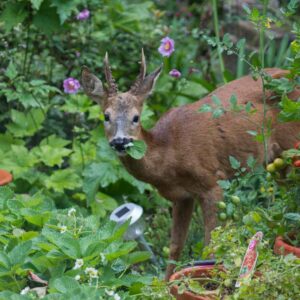By: Sarah Ward
For some, spotting a deer in your yard may be an awing or welcome sight, but to a gardener, deer can mean the difference between a healthy, thriving garden and constant damage to buds, blossoms and garden beds. While you can equip your garden with deer deterrents, fences, and garden wire, one of the most effective defenses against deer is to fill your garden with plants they naturally avoid.
What plants attract deer?
Incorporating plants that deer naturally dislike is helpful to deter deer; however, if you struggle to keep deer out of your garden, it’s equally as important to avoid or remove plants that deer are attracted to. While deer will eat just about anything, they are most attracted to young plants, tender green plants, and plants with narrow leaves.
• Common plants deer prefer include:
∗ Lettuce, pansy, ivy, hosta, tulips, lilies, roses, most fruit, trees and shrubs.
What plants do deer not like to eat?
Deer are naturally deterred by certain types of plants. This includes fragrant, poisonous, spiny and milky plants. While deer will try just about any plant in your garden, there are a few known deer-resistant plants that will help keep deer nibbling at bay.
• Toxic plants
∗ Deer tend to stay away from toxic or poisonous plants.
∗ Common poisonous plants include: Daffodils, foxgloves, poppies, larkspur, lupine, narcissus.
• Fragrant plants
∗ Deer avoid plants that have a strong scent. Consider including strong-smelling plants in your garden.
∗ These can include: Herbs, sage, ornamental salvia, lavender, bitterweed, aster, yarrow, lantana, geranium.
• Spiny, rough, or fuzzy plants
∗ Deer have a strong preference for plants that are soft and tender. Plants with spiny or rough foliage are effective in deterring deer.
∗ Common spiny plants deer avoid include: Echinops (Globe Thistle), sea hollies, cardoon, lambs ear, spirea.
• Milky or sticky plants
∗ Milky, sticky, or sappy plants are naturally caustic to deer, making them largely effective at deterring deer.
∗ Examples of milky, sticky plants include: Butterfly weed, common milkweed.
While there are a variety of plants that deter deer, our experts have compiled a list of plants proven to deter deer in our area.
Deer-resistant plants our experts recommend:
∗ Agastache (Anise)
∗ AjugaAlcea (Hollycock)
∗ Alstromeria
∗ Anemone
∗ Artemesia
∗ Asarum (Ginger)
∗ Aster
∗ Astilbe
∗ Baptisia (False Indigo)
∗ Bleeding Heart
∗ Buddlea
∗ Butterfly Weed
∗ Candytuft
∗ Centaurea (Bachelor’s Buttons)
∗ Columbine
∗ Coneflower
∗ Coreopsis (Tickseed)
∗ Cranesbill Geranium
∗ Croscosmia
∗ Delphinium
∗ Echinops (Globe Thistle)
∗ Euphorbia (Spurge)
∗ Evening Primrose
∗ Gaillardia (Blanket Flower)
∗ Gaura
∗ Ice Plant
∗ Joe Pye Weed
∗ Licorice
∗ Lily of the Valley
∗ Hellebore (Lenten Rose)
∗ Heuchera (Coral Bells)
∗ Lavender
∗ Louisiana Iris
∗ Monarda (Bee Balm)
∗ Nepeta (Catmint)
∗ Oriental Poppy
∗ Painted Daisy
∗ Peony
∗ Phlox (Garden Phlox, Creeping Phlox)
∗ Plumbago
∗ Pulmonaria (Lungwart)
∗ Rudbeckia (Blackeye Susan)
∗ Russian Sage
∗ Stonecrop
∗ Yucca

